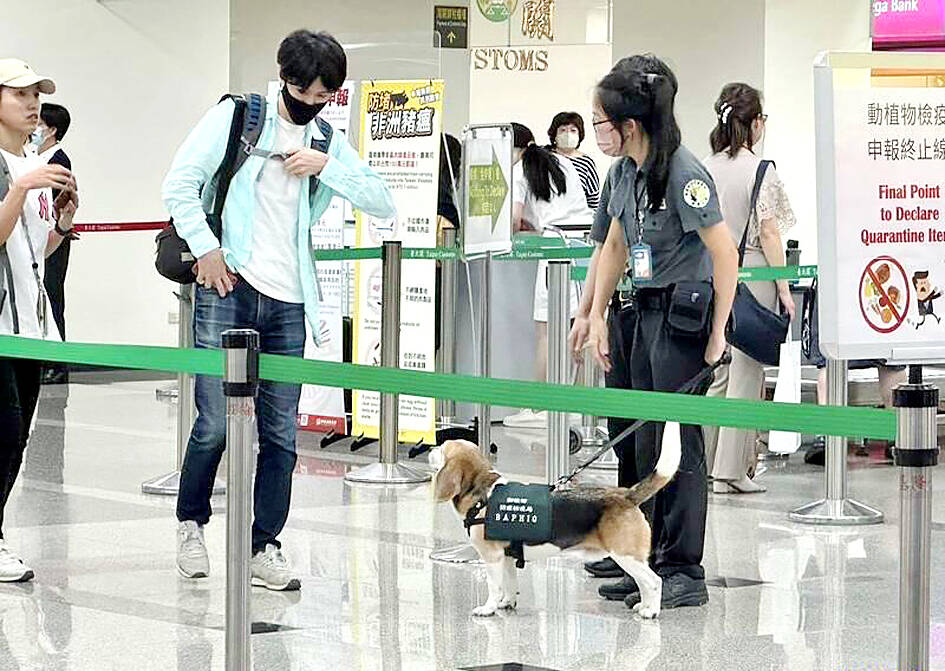People should refrain from buying rice dumplings or bringing other products that contain pork from abroad for Dragon Boat Festival to help prevent African swine fever from affecting the local pork farming industry, the Ministry of Agriculture’s Central Emergency Operation Center for African Swine Fever said on Friday.
The African swine fever epidemic remains a serious concern globally and spread to six new countries last year, the center said.
While the disease has become epidemic in 19 Asian countries, as well as others in Europe and Africa, Taiwan is free of it thanks to the government’s interagency efforts and the public’s cooperation, it said.

Photo: Taipei Times
To precisely evaluate the risk of an epidemic outbreak locally, authorities conduct testing for the African swine fever virus at customs on intercepted pork products illegally imported from overseas, the center said.
From Aug. 27, 2018, to the end of last month, 899 out of 8,543 specimens, or 10.5 percent, tested positive for the virus, it said.
Test results showed that nearby countries such as China, Vietnam, Thailand and Malaysia still have a high risk of spreading the disease internationally, with Chinese products having the highest positivity rate of 11.4 percent, the center said.
People are advised to make sure that food products they intend to bring back to Taiwan do not contain pork, it said.
Given the increasing risk of pork products, such as rice dumplings, being illegally carried by inbound travelers leading up to Dragon Boat Festival on May 31, authorities at customs were asked to boost inspections of illegally imported meat products to block African swine fever, the center said.
Agencies would continue to publicize the regulations among people who might not be familiar with local disease prevention and quarantine laws, including immigrants, foreign travelers, migrant workers, international students and overseas Taiwanese, it said.
All international parcels would be examined using X-ray machines and detection dogs at customs to ensure that no illegal pork products are smuggled in, the center said.
The average number of illegal pork imports was 3.77 cases per 10,000 travelers before the regulations were tightened in April 2023, but it had dropped to 1.91 per 10,000 at the end of last month, despite an increase in arrivals, it said, adding that high monetary penalties have effectively deterred people from wrongdoing.
First-time offenders who illegally carry pork products into Taiwan from areas that in the previous three years were listed as having an African swine fever epidemic or illegally import pork products from the areas via postal services would be fined NT$200,000, the center said.
Data showed that rice dumplings containing pork are the most common illegal items identified by custom authorities around Dragon Boat Festival over the past few years, it said, calling on the public not to have overseas friends or relatives send pork products to Taiwan.
Regarding local African swine fever prevention measures, the center said it would focus on reducing the risk of the disease transmitted via food waste.
Hog farms with fewer than 200 pigs are banned from giving their animals food waste, while those with 200 or more pigs can feed pigs food waste if they have permission, it said.

TRAFFIC SAFETY RULES: A positive result in a drug test would result in a two-year license suspension for the driver and vehicle, and a fine of up to NT$180,000 The Ministry of Transportation and Communications is to authorize police to conduct roadside saliva tests by the end of the year to deter people from driving while under the influence of narcotics, it said yesterday. The ministry last month unveiled a draft of amended regulations governing traffic safety rules and penalties, which included provisions empowering police to conduct mandatory saliva tests on drivers. While currently rules authorize police to use oral fluid testing kits for signs of drug use, they do not establish penalties for noncompliance or operating procedures for officers to follow, the ministry said. The proposed changes to the regulations require

The Executive Yuan yesterday announced that registration for a one-time universal NT$10,000 cash handout to help people in Taiwan survive US tariffs and inflation would start on Nov. 5, with payouts available as early as Nov. 12. Who is eligible for the handout? Registered Taiwanese nationals are eligible, including those born in Taiwan before April 30 next year with a birth certificate. Non-registered nationals with residence permits, foreign permanent residents and foreign spouses of Taiwanese citizens with residence permits also qualify for the handouts. For people who meet the eligibility requirements, but passed away between yesterday and April 30 next year, surviving family members

China Airlines Ltd (CAL) yesterday morning joined SkyTeam’s Aviation Challenge for the fourth time, operating a demonstration flight for “net zero carbon emissions” from Taiwan Taoyuan International Airport to Bangkok. The flight used sustainable aviation fuel (SAF) at a ratio of up to 40 percent, the highest proportion CAL has achieved to date, the nation’s largest carrier said. Since April, SAF has become available to Taiwanese international carriers at Taipei International Airport (Songshan airport), Kaohsiung International Airport and Taoyuan airport. In previous challenges, CAL operated “net zero carbon emission flights” to Singapore and Japan. At a ceremony at Taoyuan airport, China Airlines chief sustainability

‘ONE CHINA’: A statement that Berlin decides its own China policy did not seem to sit well with Beijing, which offered only one meeting with the German official German Minister for Foreign Affairs Johann Wadephul’s trip to China has been canceled, a spokesperson for his ministry said yesterday, amid rising tensions between the two nations, including over Taiwan. Wadephul had planned to address Chinese curbs on rare earths during his visit, but his comments about Berlin deciding on the “design” of its “one China” policy ahead of the trip appear to have rankled China. Asked about Wadephul’s comments, Chinese Ministry of Foreign Affairs spokesman Guo Jiakun (郭嘉昆) said the “one China principle” has “no room for any self-definition.” In the interview published on Thursday, Wadephul said he would urge China to